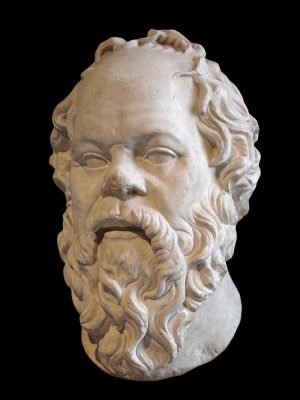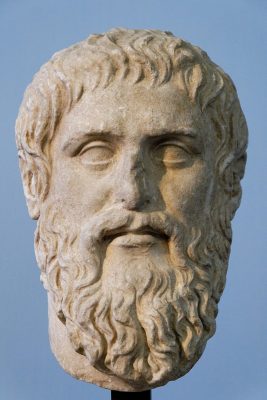The Greek philosopher Plato was the most brilliant student of the philosopher Socrates. The teacher was around forty years older than the student, and both lived in Athens. Plato’s ideas about the nature of knowledge were influenced to some extent by thinkers who were influential before Socrates’ time. However, when he became a student of Socrates, Plato’s philosophical mind turned to the questions of goodness and virtue. Plato had the highest admiration for his teacher, and so when the Athenian court found Socrates guilty of corrupting the youth and impiety, Plato was shattered. Plato was one of the youths that Socrates supposedly corrupted, but according to Plato, his teacher was the wisest man he had known. Socrates was eventually sentenced to commit forced suicide by drinking a cup of poison.
Plato had planned to enter the world of politics, but because Athenian democracy caused Socrates’ death, he grew bitter toward democracy and the evils it produced. Instead, he traveled out of Athens and studied various branches of knowledge in Italy and the Mediterranean. His studies brought him to Egypt, where he trained his mind in geometry, astronomy, and religion. After this period, Plato started writing down his philosophical ideas, which were mostly intermingled with those of Socrates’.
Plato is the most important source for scholars in trying to understand Socratic philosophy. Another student of Socrates, Xenophon, also wrote about Socrates’ trial, but unlike Plato, he was not present at the event. Furthermore, Plato’s other works are more extensive than any other work about Socrates. Socrates never wrote down any of his philosophical ideas. He viewed writing as a pretentious activity because, according to him, thoughts should only be in the mind and not be recorded anywhere outside of it. Because Plato used Socrates as a character in many of his dialogues, scholars have had a difficult time separating the student’s thoughts from the teacher’s. But, although it is not believed that Plato recorded Socrates’ speeches word-for-word, Plato may have written down accurate recollections of his teacher’s discussions. And so, scholars today look to Plato’s works as the primary source for Socrates’ philosophy.
Scholars divide Plato’s works into three parts. The first part is called the Socratic Dialogues (397 to 387 B.C.), followed by the Middle Dialogues (387 to 361 B.C.), and the Later Dialogues (361 to 347 B.C.). Works that belong to the Socratic Dialogues are Euthyphro, Crito, and the Apology. Euthyphro is a conversation about justice and piety between Socrates and the priest Euthyphro. It is set in front of the Royal Stoa, where Socrates was to defend himself against the charges set against him by his accusers. The Apology is Socrates’ legal self-defense at his famous trial. The Crito is where Socrates expresses his sentiments of submitting to the Athenian court’s death sentence out of obligation, regardless of whether he and his friends think the punishment is fair or not. A work that belongs to the Middle Dialogues is Phaedo. It is about the last moments of Socrates and his ideas on death and the immortality of the soul. Socrates explains to his friends that while the body is destroyed in death, the soul lives on in eternity. He addressed his friends’ sadness by explaining that when they bury his body, it is not Socrates anymore that they are burying because Socrates has left the body.
Many scholars cast doubts on the amount of bias contained in the Apology. These scholars argue that Plato had so much reverence for his teacher, that this may have caused him to omit parts of the trial that may have exposed Socrates’ guilt. Other scholars counter this by stating that Plato knew his account would be read by his contemporaries and even those who attended the trial. This knowledge surely must have prompted Plato to record the event without favor.

